(or: Smash the National Front – part two)
A little bit of audio for you after all that book-reviewage last week:
Podcast: Play in new window | Download
Subscribe: Apple Podcasts | RSS
Here is a short mix of reggae tunes concerned with the National Front. There is a track by track breakdown below, but what I found surprising was how few tunes there were given the NF’s popularity in the seventies when conscious reggae was coming into its own. Indeed one of the defining factors in the explicitly anti-NF Rock Against Racism movement was UK reggae bands sharing stages with punks.
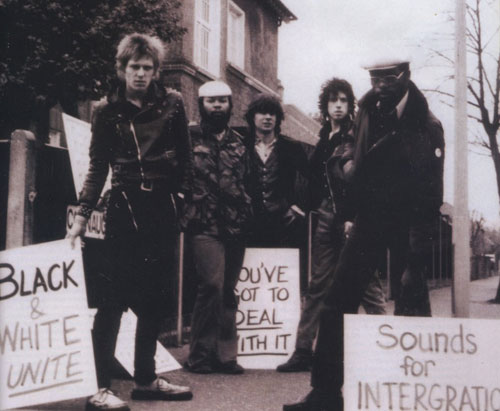
Above is a photo of members of Steel Pulse and The Clash standing outside NF head honcho (and closet homosexual) Martin Webster’s house, for example. (Obviously I wouldn’t bother to mention his sexuality were it not for the fact that he was a key player in a movement which sought the extermination of homosexuals.)
Steel Pulse’s most famous anti-racist tune is “Ku Klux Klan”, released in 1978 on Island. I’ve always been slightly curious about this, as obviously the KKK have had virtually no presence in the UK. A bit of digging around turned up this 1978 NME article on the rather excellent unofficial Steel Pulse site.
Seems that many black West Indian families who settled in Britain during the early ’50s and strived peacefully to integrate themselves into their new surroundings, haven’t – in the present imflammable atmosphere of racial disharmony – taken too kindly towards Steel Pulse making waves by performing songs with titles like Ku Klux Klan and National Front.
So the group actually had a tune named after the NF, but didn’t release it? Reading on, the possible reasons for this become clear:
And, according to Steel Pulse’s main man David Hinds, himself a first generation British born black from Handsworth, they haven’t been reluctant to voice their disapproval. “They feel,” says Hinds, “That we’re being too heavy, too outspoken.” Apparently, after seeing Steel Pulse in a recent Sight & Sound programme attired in Klansmen’s hoods chanting Ku Klux Klan, friends of their families warned them of openly inviting trouble. “They want to avoid any trouble with the white community…want to keep the peace and don’t think Natty Dread helps keep the peace. See, the truth only stirs up trouble!”
If, in Hinds’ opinion, speaking the truth causes a degree of trouble, so be it. Even if it means that despite its chart entry, Ku Klux Klan was, with few exceptions, ignored by practically every radio station in this green and pleasant land. “The radio stations don’t ban records any longer because they realise it only helps to sell them and when such a record makes the charts, they’re embarrassed because they’re not playing it.”

But the National Front do get a mention in “Jah Pickney” on their 1979 Tribute To The Martyrs album:
Rock against Racism, smash it
Rock against Fascism, smash it
Rock against Nazism, me say smash it
I’ve come to the conclusion that
We’re gonna hunt yeh yeh yeh
The National Front – Yes we are,
We’re gonna hunt, yeh yeh yeh
The National Front
Cause they believe in apartheid
For that we gonna whop their hides
For all my people they cheated and lied
I won’t rest till I’m satisfied
Unfortunately I only found that out after I’d done the mix! Steel Pulse are still a bit of a shameful blindspot in my knowledge of UK reggae.
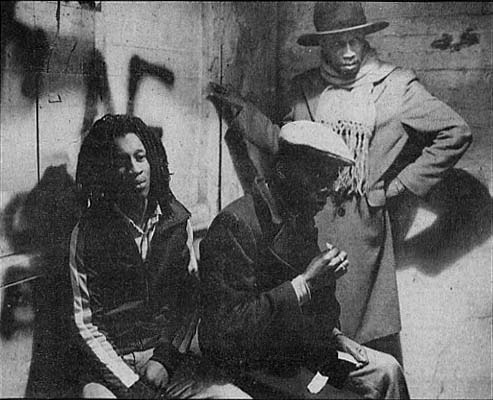
The scene in the film Babylon where Ital Lion’s HQ is turned over and vandalised with fascist grafitti is rumoured to be based on a real incident which happened to Aswad.
However the Rock Against Racism band which came off worst for wear is almost certainly Misty In Roots. Misty grew up together in Southall, West London. They worked collectively, opening a squatted community centre called “People Unite” as a place for people to gather, rehearse, get free food. People Unite was also the name of their record label.
Southall is inextricably linked with the history of the far right in the UK. In the 60s some of the then predominantly white population were so shocked by the influx of asian immigrants that the residents’ association ended up supporting British National Party (NB, this BNP predated the NF and was eventually absorbed into it) candidates in the 1963 local elections, where they polled a respectable 27.5% and 13.5%.
Tensions remained high, it seems. Then in July 1976, 17 year old Gurdip Singh Chaggar was murdered in a racist attack in Southall. His attackers were 3 white men who were apparently inspired by the National Front (although I have not been able to pin this down with a reference). Southall youth took to the streets.
Sir Robert Mark, the Metropolitan Police Commissioner commented “The motive was not necessarily racial.”
The response from NF chairman John Kingsley Reid was “that’s one down, one million to go”. When Reid was tried for inciting racial hatred for this unbelievable outburst, the Judge lined up behind him: “In this England of ours, we are allowed to have our own view still, thank goodness, and long may it last…I wish you well in your project”.
So when the NF called an election meeting at Southall Town Hall on St George’s Day 1979 most people were clear that this was nothing less than a provocation.
The People Unite community centre was used as a base for the protests and the police decided to close it down: “The building was so badly damaged by the police action that afterwards, it had to be destroyed. Officers with batons smashed medical equipment, a sound system, printing and other items.”
And people. Many of Misty in Roots were present. Clarence Baker, Misty’s manager, was beaten into a coma by the cops. Two members of the group were arrested and jailed on trumped up charges. Perhaps they got off lightly – Blair Peach, another anti-fascist protester, was killed later in the day after a blow to the head from a member of the Special Patrol Group.
The day and aftermath is chronicled in more depth here.
There are some comments from Misty’s singer Poko here, but I particularly want to highlight this:
For the people of Southall it was something that could never be forgotten. We had all been involved in an uprising, the police had bloodied us, and they were still there terrorising us long after the protest had finished.
But among the fear there was also a sense of unity. The whole thing raised the consciousness of the young Asians in particular. And there is still a connection to 1979 to this day.
Across Southall there are Asian-run reggae sound systems – a tradition that started not long after the uprising. A lot of Asian kids began to relate to the spirit of resistance that you find in reggae.
It is easy to forget, when reading the above, that fighting the NF wasn’t always big demonstrations like Lewisham 77, or concerts, or marches. It was a two way street with Enoch’s “rivers of blood” in the gutters.
NF supporters were suspected of firebomb attacks on music venues like the Four Aces in Dalston, and Acklam Hall in Ladbroke Grove. Not to mention the petty intimidation and outright racist violence that was part of the everyday landscape in the 1970s.
The “cultural war” of Rock Against Racism has to be seen alongside the groundwork of community organisations, politicos, “squadists”, and even everyday people who just had a chat with their mates when they were spouting bollocks. Compared to all this it seems a bit pathetic to be rummaging through some dusty vinyl once again, but that is what started me off on this whole post which has now spiraled slightly out of control. So here goes:
Chant Down The National Front: tune by tune

The Phantom – Lazy Fascist (Cool Ghoul 7″ 1978)
This is quite a mysterious record, produced by persons unknown.
There are a number of quite suspicious aspects to the track- the vocalist’s accent is faux American rather than (faux) Jamaican, “Cool Ghoul” could be a “ghost face”-esque reference to whiteness? At least one record dealer has speculated about it being a secret project of Tom Robinson, but that may just be to shift records, so I am sceptical. More importantly the lyrical content focusses more on the economic aspects of colonialism: “you call us when you need our labour…” than the more usual slavery and displacement.
The “chase those fascists out” chant is straight off a lefty demo and the line “If this song offends you – you’re a fascist too… fascist!” IS Vivien off the Young Ones.
The less said about the racial stereotyping of “You pad your pants to try and look like a man / And we’ve been pumping iron gonna move like lion” the better – except to point out that the “lion” is the track’s the only nod towards rasta imagery.
One of the people involved was interviewed in Black Music magazine and quoted in Dick Hebdige’s Cut and Mix book:“[The National Front] love to hear the Rastas talking about repatriation ‘cos it makes their jobs a lot easier”
I find this interesting when contrasted with the ambiguous comments made by Jah Shaka on the subject which lead to an extended discussion on the Blood and Fire board.
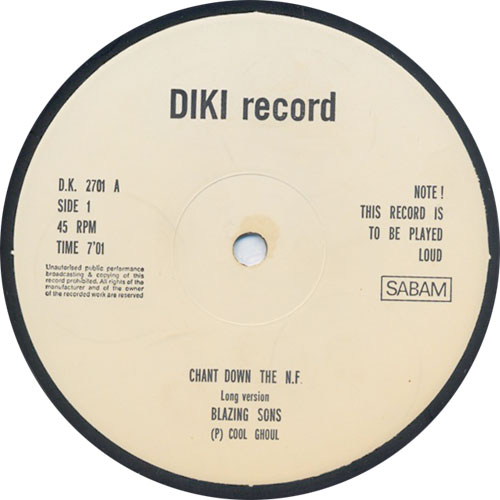
Blazing Sons – Chant Down The National Front (DiKi 12″ n.d.)
This also originally came as a Cool Ghoul 7″, but was re-released on a Belgian label as a 12″. A marked improvement both lyrically and musically, with some nice steppers business on the version.
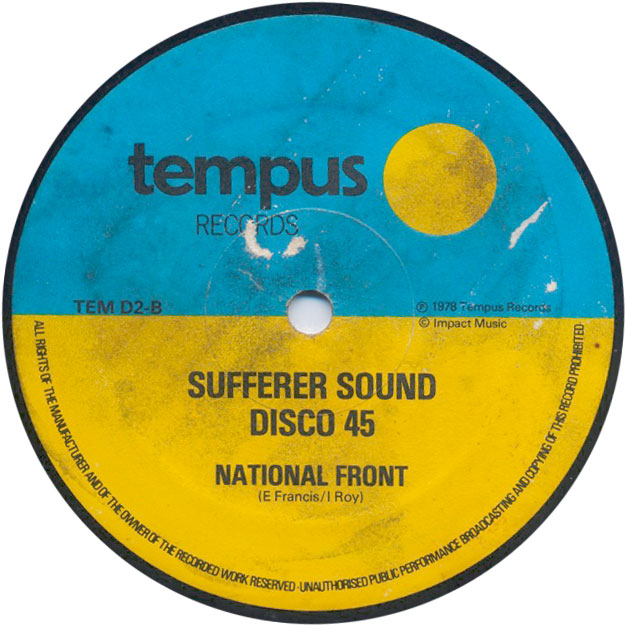
Sufferer Sound – National Front (Tempus 12″ 1978)
I can’t put it any better than Bill Dew in his article Dub – The Vinyl Frontier:
A delightfully, distinctively British cut from a label most commonly associated with Dennis Bovell. Indeed, I would hazard a guess that Blackbeard had a hand in this production, a very loose rendering of ‘Norwegian Wood’ positively brimming over with idiosyncratic flourishes. The dub spotlight glances off the melody, extending and accentuating certain key notes by accident and design before imploding, ‘transformer’ style, in an ecstatic liquid rush of stellar phase effects. Can nobody mix dub like this anymore?
Bovell has always been pretty outspoken about the effect that Enoch Powell’s speeches had on black people living in the UK. His band Matumbi played the first ever Rock Against Racism gig at the Royal College of Art in December 1976.
But this is an instrumental…

Linton Kwesi Johnson – Fite Dem Back (From “Reggae Greats” compilation, Island, but originally released on “Forces of Victory”, 1979)
Admirable militancy from the man like LKJ. I could also have included “Reggae Fi Peach” (in tribute to Blair Peach, see above). But this is more fitting for the mix, really. Dennis Bovell produced the track, of course.
“Fight Dem Back” is also the name of an Antipodean anti-racist organisation. I know this because the nice man who runs the Slack Bastard anti-fascist blog steadfastly links to my piece on Nicky Crane every time he comes up in conversation.
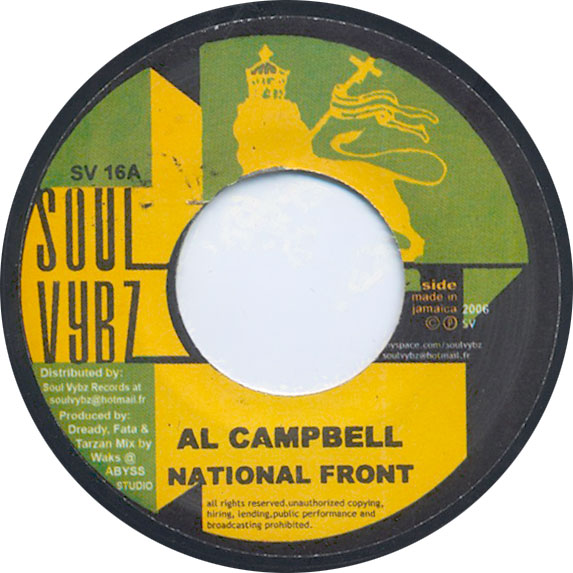
Al Campbell – National Front (Soul Vybz 7″ 2006)
Proof positive that the fight against fascism is always with us. I believe this is a French reworking of a tune off Al’s 1985 “Forward Natty” album (but I haven’t heard that – can you help?). So it’s now directed straight at the head of Le Pen and the French NF. I really like this because it avoids preachiness by including great lyrics about how Al is going to:
“Hit them with the bassline
Smash up them waistline
Hit them with the riddim
Stop them ism and schism”
Don’t you mean Rick from the Young Ones?
The Aswad studio vandalism is given a couple sentences on the sleevenotes to the Homosexuals box set. I will type them out here if I get the chance, and if they are interesting…
Fascinating stuff John. Don’t have time to listen to the tunes at the moment but I am very impressed by the words. I’ll come back later, have a cup of tea and a spliff and delve deep into that Blood & Fire messageboard discussion … Great piece though.
Yeah I mean Rick, gah. Ah well it’s good to be pulled up on my knowledge of the Young Ones rather than my sociology, ha ha. How come Aswad are mentioned on the sleevenotes for the Homosexuals? Yes please, more info!
Thanks Mr Smith!
‘Yeah I mean Rick, gah. Ah well it’s good to be pulled up on my knowledge of the Young Ones rather than my sociology’
My parents are big fans of both, you want test me you dead! etc etc.
Aswad were friends with the Homosexuals and allowed them to use the studio.
That’s just great, imagine if they had done a record together… “Aswad meets the Homosexuals uptown”
excellent stuff, John – knew some of this stuff, certainly didn’t know about the judge’s comments re: the project 🙁
Nice one, John!
That all took me back. Misty in Roots, etc. Oh, and what about Black Slate – very underrated Uk Reggae band. We supported them in Bridgewater once – lovely blokes!…let us borrow their bass-amp, etc.
One thing at the time (1970s/early 80s) was that many black radicals – e.g. Race Today Collective which LKJ was involved with – tended to be sceptical about white left anti-fascism. It was not that they didn’t see the National Front as a threat but more that it was only one threat alongside the daily reality of police racism and other forms of oppression. So perhaps that is one factor in the relative dearth of anti-NF records.
Really glad you brought this material up and im glad that this era is getting some representation in the blogosphere at last. It was bands like MIR, Steel Pulse that united people of many races.
LOL, that Cool Ghoul record sucks. Sure it wasn’t David Widgery?
Pingback: POTENTIAL TO-DOS FOR A POST-OKTOBERFEST SATURDAY /// SEEN.´S NON-HIPPIE REGGAE AND DANCEHALL BLOG
Pingback: AND IF THIS SONG OFFENDS YOU, YOU’RE A FASCIST TOO « YOU CAN'T EDUCATE BACON.
Dear John
Would you by any chance have a hi-res version of the photo of The Clash and Steel Pulse members as shown at the top of the page of your blog? Could one be made available – did you take the picture or do you know its provenance?
most cordially
Bryan
Hi Bryan – it’s from a music magazine – one of the “reggae specials” by Q or Mojo or something… I’ll try and have a look and see if there is a credit…
HIS BOOK IS A MUST!!! It not only features reggae superstars Lee Scratch Perry but Augustus Pablo and Junior Delgado.
A book of photographs by Pogus Caesar celebrating Britain’s iconic black musicians is to be published next month.
The book features evocative, nostalgic and largely unpublished images of musical legends like Stevie Wonder, Grace Jones and Lee ‘Scratch’ Perry.
“These images record a unique period in what would come to be called black British life,” remarks author and historian Paul Gilroy.
“Pogus Caesar’s emphatically analog art is rough and full of insight. He conveys the transition between generations, mentalities and economies.”
Legendary reggae artists figures prominently, and appropriately, in the Caesar image canon – Burning Spear, The Wailers, Augustus Pablo, Rita Marley, Mighty Diamonds, Black Uhuru, Sly Dunbar, Steel Pulse etc. The photographer cites reggae itself is a significant influence, reflecting his own St Kitts background in the Eastern Caribbean.
The launch of Muzika Kinda Sweet follows an exhibition of the work at the Oom Gallery in Birmingham earlier this year.
can you post some posters of all these bredrin, MISTY IN ROOTS,where is me bredrin Munya Brown.ASWAD imean like all these pages if possible plse, remember BLACKBEARD. Cause i need them as a reminder of those days when reggae music was real music Iyah hear mi.It inspired most of the African countries which were on the frontline.RASTAFAR I!